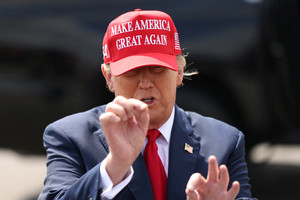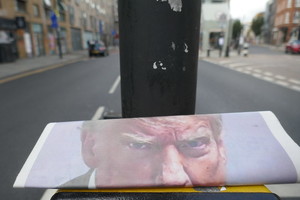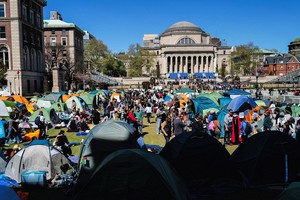Supreme Court Ends Session With Four Major Rulings

The Supreme Court wrapped up its session last week, but not before handing down rulings on election laws, Biden's student loan forgiveness program, First Amendment protections, and affirmative action.
Elections: The court rejected an argument from North Carolina lawmakers that the U.S. Constitution exempted state legislatures from judicial review in election cases. The rejected theory has previously been used to defend gerrymandered districts and oppose state court rulings on absentee ballot policies during the 2020 election.
Student Loans: The court ruled the president's invocation of the HEROES Act to forgive student loan debt was unconstitutional, ending the program. If Biden wishes to move forward with student loan forgiveness, he will need to work alongside Congress. "The question is not whether something should be done," the majority opinion stated, "it is who has the authority to do it."
First Amendment: The court ruled a Christian web designer in Colorado can deny clients seeking her services to make websites for same-sex weddings. The case was a challenge to Colorado's Anti-Discrimination Act, which the court determined "seeks to force an individual to speak in ways that align with its views but defy her conscience about a matter of major significance."
Affirmative Action: The court ruled affirmative action in college admissions is a violation of the 14th Amendment. Originally filed in 2014 by Students for Fair Admissions, the plaintiffs argued Harvard University was unfairly discriminating against Asian Americans. Chief Justice Roberts' said the admissions process lacks "sufficiently focused and measurable objectives warranting the use of race."
How the Media Covered It: The election law case received the least coverage of all the rulings. The other three were covered heavily, with large divides in coverage. Left-rated voices were typically opposed to the rulings and highlighted opposition to the court, while right-rated outlets pushed back on criticism and defended the rulings. Left-rated outlets more heavily covered a report about the web designer case— the gay couple that requested the designer's services does not appear to actually exist.
More from AllSides
Snippets from the Right
The Supreme Court Just Helped Save American Democracy From Trumpism
David French (opinion)
"In regard to 2024 and beyond, the Supreme Court’s decision eliminates the ability of a rogue legislature to set new electoral rules immune from judicial review. State legislatures will still be accountable for following both federal and state constitutional law. In other words, the conventional checks and balances of American law will still apply."
Democrats Rail against a Fictional Supreme Court
National Review (opinion)
"Democrats see ignorance as an opportunity. Why not take Americans’ empty brains and fill them with tales of a fictional Supreme Court led by right-wing extremists and corrupt Manchurian justices who exist only to do the bidding of big-money donors? Granted, it is much easier to do battle with a Supreme Court that exists only in your head. Reading opinions takes a long time (yuck!) and requires formulating nuanced responses (ugh!)."
Snippets from the Center
What Supreme Court ruling against Biden’s student loan forgiveness plan could mean for the U.S. economy
CNBC (analysis)
"Estimates suggest consumers would spend about 3% to 6% of their increased wealth on new or accelerated purchases, according to the Committee for a Responsible Federal Budget. That dynamic may have exacerbated inflation, said economists. Put another way, if consumers had more wealth — as much as $20,000 — to spend on goods and services, that may have served to prop up prices."
Can Colleges Be Racially Diverse Without Affirmative Action? Experience Suggests No
Wall Street Journal (analysis)
"Among the reasons why these efforts have fallen short: Colleges often look first to socioeconomic status as an alternative to race, given the significant overlap between racial minorities and low-income students. But it’s a flawed proxy. There are more low-income white households than there are low-income Black and Hispanic households combined."
Snippets from the Left
Five key takeaways from the Supreme Court’s anti-LGBTQ decision
LGBTQ Nation (opinion)
"The right wing of the Court has been looking for an excuse to elevate the rights of conservative Christians at the expense of LGBTQ+ people for a while. This case was the perfect vehicle. So what that Lorie Smith, the owner of the firm in question, never made a wedding website in her life. So what if no one actually asked her to make one. So what if the case included a fake request from someone who turned out to be a straight man. None of that mattered."
Why the Champions of Affirmative Action Had to Leave Asian Americans Behind
The New Yorker (opinion)
"Affirmative action was toppled five years ahead of schedule, simply because an admissions office clearly relied upon stereotypes—in this case, casting many Asian applicants as hardworking grinds with little personality. (Harvard has consistently denied that this is the case.)"

April 29th, 2024

April 29th, 2024

April 26th, 2024

April 25th, 2024